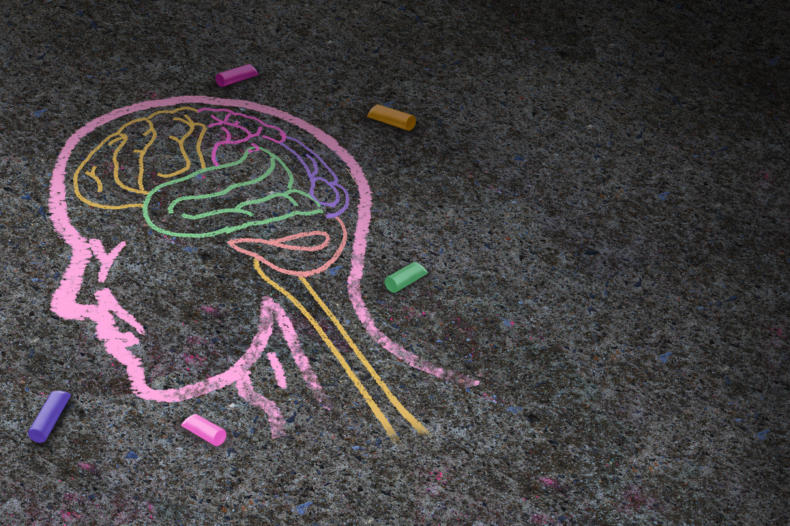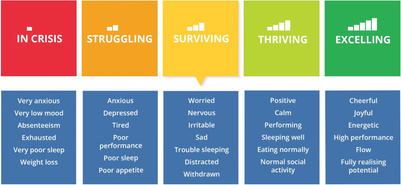Banishing Blue Monday
Practical strategies to help you manage and protect your mental health and promote positive wellbeing in yourself and those around you.

January can be a difficult month for many reasons. The combination of dark evenings and winter weather make it harder to get a fresh air fix, while the post-festive season slump manifests itself both motivationally and financially as we count the cost of holiday indulgence.
And that’s in a normal year.
2020 was anything but normal and, with the ongoing uncertainty of the pandemic casting a shadow over the new year, it is not surprising that many of us are feeling the effects on our own mental health and seeing those around us struggle. Many of the coping strategies we might normally turn to, such as socialising with friends, exercising, enjoying arts and culture, or even planning for the future, are not available to us right now.
Tempting though it is to prioritise other things in our busy lives, mental health is the foundation of wellbeing and we should invest in supporting it in the same way that we focus on maintaining our professional skills and our physical fitness; in fact these often go hand in hand.
On Blue Monday – dubbed the “most depressing day of the year” – we want to provide some information and practical tools for managing mental health. Penny Aspinall, a highly experienced counsellor and trainer, offers insight into how to understand and protect our own mental health and that of those around us.
Understanding the mental health continuum
A first step to proactively managing our mental health is to understand that we are all on a mental health continuum. At the top end of the continuum we are “excelling” – we’re feeling calm, confident and successful. Even when things are not going perfectly, we might still be “thriving", meeting the challenges that come our way positively.

The critical point comes when we tip from “thriving” into “surviving” mode, when we find it hard to manage and our mental health begins to suffer. Learning to recognise the moment we flip between thriving and surviving is foundational to supporting our mental health because at this stage we can enact positive coping strategies, including talking to others and asking for help, so we can move out of survival mode and back towards thriving once again.
Signs that our mental health is beginning to suffer naturally vary from person to person, but can include struggling to sleep, finding it hard to switch off from work or home worries and having intrusive thoughts.
If we are unable to recognise this crucial point on the continuum – and it is not easy when we are feeling stressed and distracted – we can spiral into the “struggling” zone, where we feel overwhelmed and our physical health suffers alongside our mental state. Unchecked, this can lead to a mental health crisis.
Identifying helpful versus unhelpful coping strategies
To prepare ourselves to meet mental health challenges, it is important to find helpful coping mechanisms. These are the strategies that we can activate to help us on the journey back towards “thriving”.
It is often tempting to opt for short term fixes – an evening glass of wine to wind down or working those few extra hours to get a particular job done. But when one glass becomes three, or overworking becomes a habit, these mechanisms become destructive and add to anxiety.
Rather than making short term fixes, Penny advises us to develop a wellbeing action plan in which we identify what helps us to stay well and what contributes to us becoming unwell. This involves paying attention to our stress and anxiety triggers and noting the early warning signs that our mental health is starting to move from “thrive” to “survive” mode. By writing these down –using a tool like the Charlie Waller wellbeing action plan template – we can start to see the patterns that appear when our mental health is deteriorating.
Then, we need to identify what positive actions we need to take to relieve the pressure. These naturally vary from person to person, but there are some common themes which Phil Hammond, GP and comedian has dubbed CLANGERS:
- CONNECT with others and try not to isolate yourself when you are struggling. Although it is hard to connect in-person right now try to reach out by phone or videocall and talk about how you are feeling.
- Keep LEARNING and try to be creative. Learn a new skill on youtube or try out a new recipe. You don’t need to take on a huge challenge, but simply stimulate your brain with something unfamiliar.
- Be ACTIVE in whatever way you enjoy. Whether it is a ten-minute walk or a 5k run, getting outside and elevating your heart rate are proven mood-improvers. Even if you cannot go out, try to avoid sitting in front of your screen all day. There are many online activity classes available so you could combine activity with learning something new.
- NOTICE the world around you and try to avoid becoming introspective. When you are outside, notice nature. When talking to friends, really pay attention.
- GIVE to others. As Abraham Lincoln said, “when I do good, I feel good.” Even if it is just paying a compliment or giving some positive feedback, take the time to help someone else through these tough times.
- EAT well. There are strong links between mood and food but eating well is often abandoned when we are under pressure.
- Make time for REST and RELAXATION. Particularly right now when so many leisure activities are not possible, it can be tempting to simply keep working and support your employer but ultimately this is counterproductive. Not taking time to relax and reset can lead to burnout.
- Get quality SLEEP. Lack of sleep can worsen symptoms of anxiety, so it is important to develop positive sleep habits and aim for seven to nine hours per night. Tips to aid sleep include stopping blue light exposure from devices an hour before bedtime, not checking the clock if you wake in the night.
Building boundaries when working from home
In the current situation it can be easy to end up working longer or more unsociable hours with fewer breaks. We are also seeing fewer people taking fewer holiday days which, while it is understandable when travel options are so limited, ultimately is counterproductive. The brain and body need regular breaks and downtime to avoid burnout and putting work boundaries in place can help you achieve this:
- Schedule 50-minute meeting slots that allow you a break between sessions to step away from your screen.
- Plan breaks into your day using your diary.
- Put firm boundaries in place between work and leisure/relaxation time and, if possible, work in a different place to where you relax.
- Utilise the email inbox pause feature, so you aren’t receiving emails at unsociable hours.
- Silence whatsapp groups when you need to and don’t feel guilty about taking time off – it is the responsible thing to do for you and your employer.
Maintaining good mental health is not easy, particularly right now. Above all, it is important to be kind to ourselves and practice self-compassion. This is not about pretending that bad things aren’t happening or that they aren’t making us feel unhappy. It is about acknowledging that we are finding things hard and permitting ourselves to devote time to supporting our mental health, which underpins our wider wellbeing.
If you are struggling with your mental health, talk to someone - a friend, colleague, partner or family member, a mental health first aider in the workplace, your GP or a helpline such as the Samaritans. There are many online resources and groups including some specific to our sector, including Hub of Hope; IP Inclusive; Jonathan’s Voice and LawCare.
For more on proactively managing mental health view our on-demand webinar with Penny Aspinall, which also examines the mental health impacts of perfectionism, imposter syndrome and presenteeism and how to address them.

